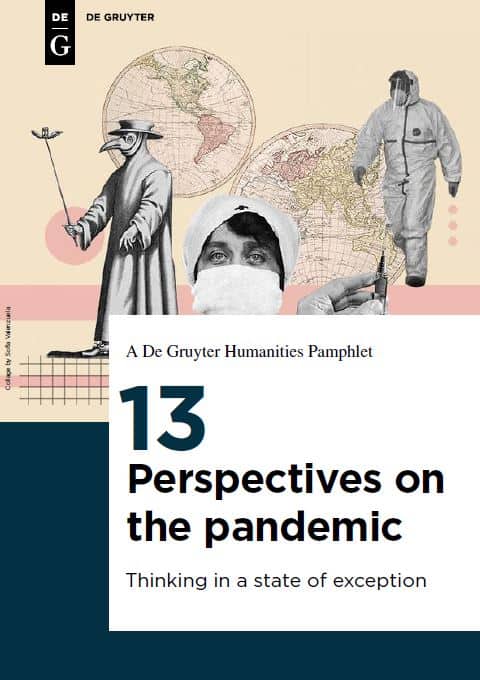The Humanities – Marginalized After Corona?
A crisis like the Covid-19 pandemic that affects the very core of human existence could also endanger the existence of the humanities and the study of culture. Will a “pandemic turn” sweep across all research and scholarly inquiry?
This essay was first published in the free digital pamphlet 13 Perspectives on
the Pandemic: Thinking in a state of exception.
At present, the corona crisis seems to have displaced all other topics from public discourse. It has led to a narrowing and simplification of all areas of life — indeed, to an unprecedented reduction in their complexity. The crisis has radically limited our communications, our free movement, the possibility of travel, our scope for individual decision-making. But it has also caused the global research landscape to contract: the coronavirus pandemic has become the common denominator of all research topics deemed worthy of pursuing, the general sign under which all research is conducted.
Humanities disciplines, with their search for meaning, their impulse to question and challenge received wisdom, their analytical attitude towards cultural differences and subjective positions, will bear the brunt of this contraction. They will probably suffer losses as the world hones in ever more on medicine, virology, the natural sciences, and technology.
A Dark Future Ahead?
In times like these, if we turn to research questions and topics in the humanities that were well-attended to before the crisis, such as practices of translation, notions of cultural hybridity, the history of emotions, migratory movements, or ecocriticism, amongst many more, we face a number of compelling questions. How must these topics be redefined in order to retain their relevance as the corona crisis looms large? Will topics and research areas that were thought relevant before the crisis be jettisoned if they cannot be brought in line with a “pandemic turn” in the humanities? Does everything have to be pruned to relate to corona? Who will still be interested in Byzantine papyrus research when they’re up to their neck in the virus? Have all but a handful of topics and academic disciplines become redundant? Conversely, shouldn’t we pour all of our resources into epidemiology, medicine, biology, biotechnology, and virology?
New, hastily launched research projects funded by the German Research Foundation (Deutsche Forschungsgemeinschaft, or DFG) and a number of new projects by academic publishers reflect this swift change in research priorities. Meanwhile, entire subject areas are left behind. Theater and the arts, for instance, will probably be the last to return to “business as usual”, if they manage to survive at all, that is. They are obviously not considered vital. And what about cultural studies? Tasked with critically observing and intervening in cultural debates, are they not just getting in the way of the accelerating biopolitical restrictions and measures?
Indispensable Humanities
No! On the contrary: the humanities and the study of culture are indispensable, especially given the need for a critical approach to the crisis and the measures taken in response to it. Looking at the biopolitics of the crisis from the perspective of cultural studies prompts questions about the cultural politics of the crisis, about the diverse ways in which different cultures perceive the crisis, whether in pragmatic, technological, apocalyptic, or religious terms, and respond to it. A cultural studies perspective allows us to interrogate the racist implications of our responses to the crisis, the changes they entail in the relationship between the private and public spheres, the ways they transform not only how we work, but the global capitalist order in its entirety. Efforts to limit the global spread of this pandemic lead to tectonic shifts in how space and distance are regulated and societies controlled, and to forceful rearrangements of hitherto asymmetrical relations of geopolitical power.
Yes, everything seems to fall within the force field of the coronavirus pandemic; everything is redefined with reference to it. Yet from where we’re standing now it’s hard to tell whether the crisis will bring about a long-term paradigm shift in scholarly research or even a broader epochal turn that will permanently change our realities and behaviors. Sociologists doubt it will: fundamental social behaviors have historical depth, a kind of longue durée, they create a sense of continuity in the face of social change. As the measures taken to combat the pandemic become the “new normal”, as we get used to them and start forgetting, collectively, the shock of their introduction, society will be restored to its previous state. But when it comes to the humanities and cultural studies in the post-corona era, we have good reason to fear that they will be further suppressed and marginalized.
“One thing is for sure: the corona crisis will usher research in the humanities into new, unchartered territory.”
A Metamorphosis of the World
Yet the more advances in science and technology dictate sweeping restrictions to fundamental social rights, the more tenaciously the humanities must hold on to their critical perspective and emphasize the complexity of the circumstances — even if their funding is crippled. Because we need them to translate, to make intelligible to us, how the crisis is socially mediated and dealt with in different cultures around the world.
Long before the outbreak of the corona virus, the late Ulrich Beck saw in the radical disruption of all familiar certainties, dominant interpretive frameworks, and analytical arguments, a fundamental “metamorphosis of the world”. The corona crisis has certainly brought about such a metamorphosis of the world. But it’s a metamorphosis that isn’t only disruptive: it is also a constructive challenge to overcome received ideas and supplant them with new ones. The humanities, with their emphasis on critically interrogating historical and social circumstances, can not only provide new ways of thinking in the post-corona era, but also point us towards new ways of acting. One thing is for sure: the corona crisis will usher research in the humanities into new, unchartered territory.
Learn more in this related title from De Gruyter
[Title image: Zhang Xiaogang/Untitled]
